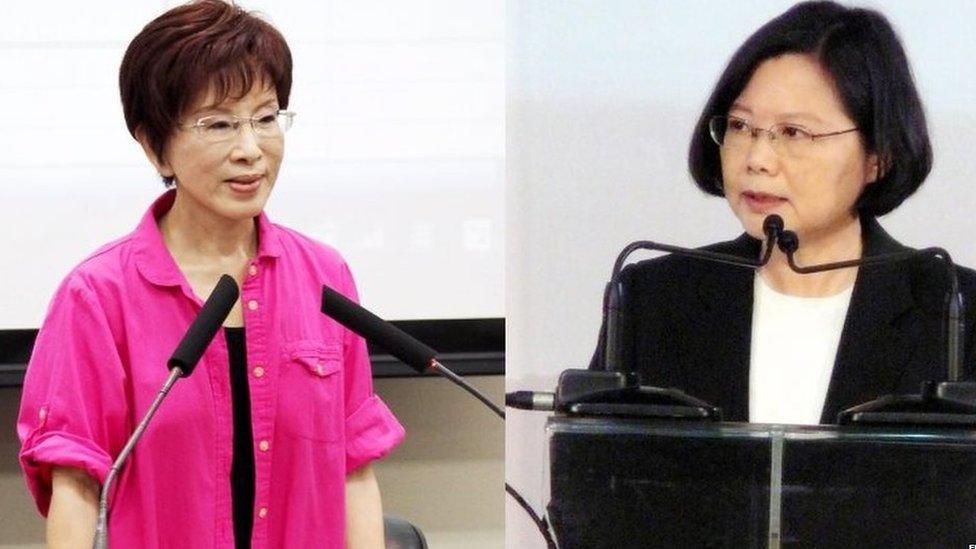Taiwan president rues lack of progress with China
- Published
President Ma: "The situation on the mainland is sometimes better and sometimes worse - it's not very stable."
The president of Taiwan has said that political progress in mainland China is unstable. Speaking in a rare interview with the BBC, Ma Ying-jeou said he was disappointed that despite improvements in the economic relationship during his two terms as president, there had been no meeting between himself and President Xi Jinping of China.
"Mainland China is only 100 nautical miles away from the Republic of China (Taiwan). Therefore it's a big risk and a big opportunity for us. Any leader here has to learn how to minimise the risks and maximise the opportunity. That's what I've been doing for the past seven years," he said.
The Chinese government claims the island of Taiwan as part of its sovereign territory and threatens to counter any move to outright independence by military force.
The first time I visited Taiwan in the early 1990s, there were no direct flights from Beijing. Along with everyone else, I had to make a long-distance dog-leg via Hong Kong.
In those days, Beijing was still a low-rise city of coal dust, brick alleys and bicycles. Taipei felt glossy and high-rise by comparison. How things have changed. There are now more than a hundred flights every day across the Taiwan Strait, Beijing is a city of glass and concrete canyons, and China bestrides the global economy.
Psychological distance
Nowhere has experienced the drama of China's rise more viscerally than Taiwan. Two-fifths of the island's exports go to the mainland and there were nearly four million tourist visits by mainlanders in the opposite direction last year.
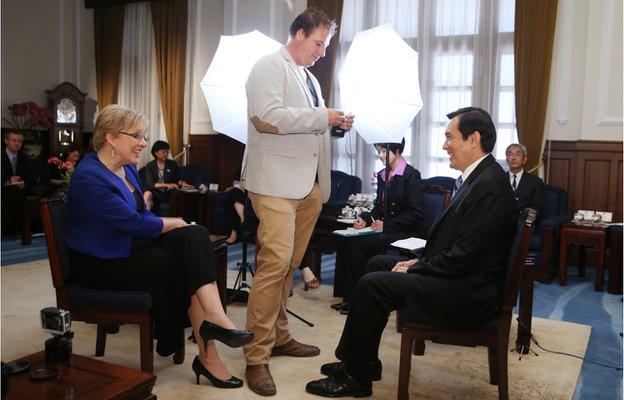
President Ma said the human rights situation in mainland China was "unstable"
But President Ma told me the politics of the communist state are still a serious stumbling block to good relations.
"In the past several years I've been constantly reminding the mainland Chinese authorities that the important thing is to close the psychological distance between people across the strait. Taiwan believes in the core values of freedom, democracy, human rights and rule of law.
"But now we also see that the authorities have arrested some human rights advocates including some lawyers. So that's why people will worry that the human rights situation in China is deteriorating.
"The situation in mainland China is sometimes better, and sometimes worse. It's not very stable."
Strategic shift
On the day I visited President Ma, I was not his only visitor.
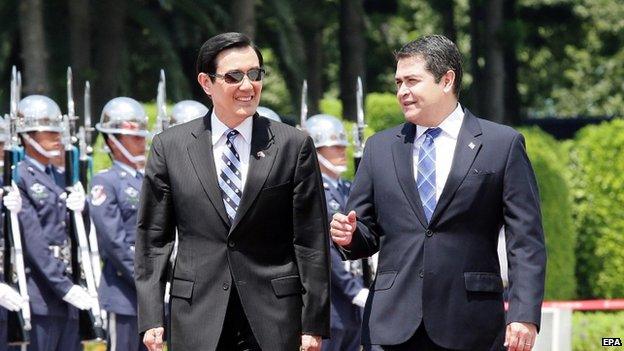
President Ma also received the Honduran President, Juan Orlando Hernandez, on the day the BBC visited
The president of Honduras was due for a state reception straight after our interview, and the blue and white flag of Honduras was flying outside the presidential office, an imposing red-brick palace built during Japanese imperial rule.
Of course, the Japanese colonialists are long gone but so too are all the embassies which clustered here in the 1950s and 60s after the KMT fled the communist advance on the mainland and set up a last toehold for their Republic of China on Taiwan.
For two decades, this was celebrated by a succession of American presidents as the rightful government of the whole of China and a bulwark against a global socialist threat.
But most countries transferred recognition to Beijing in the years after President Nixon signalled an American strategic shift with the famous meeting with Chairman Mao.
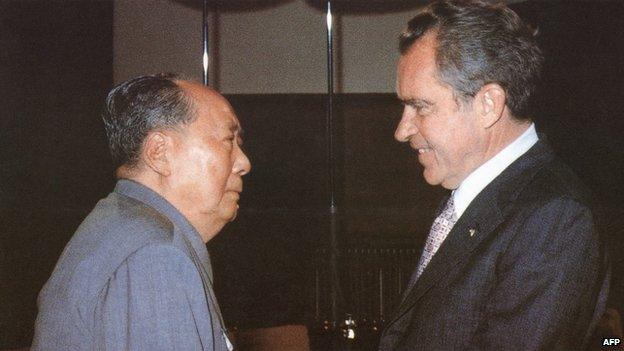
Chairman Mao and President Nixon met in Beijing in 1972
And now China firmly freezes Taiwan out of international organisations. The only state visitors walking President Ma's red carpet are from tiny countries like Burkino Faso, Haiti and Honduras.
And he told me he was disappointed that after two terms of working hard to improve relations with the mainland, Beijing is still resisting a face-to-face meeting.
"A meeting of leaders should be a natural development. In the past two years we were hoping to use last November's Apec summit as an opportunity. However, it was not successful which was of course a very great pity.
"Of course we are not clear about the decision-making process, but I believe it was Mr Xi who made the final decision."
Patience and caution
The language pitfalls surrounding cross-strait relations are as delicate as doctrinal questions in the medieval church and make me nervous about writing on the topic.
But the fundamental point is that since 1949, the People's Republic of China has insisted that it is the rightful government of a China which includes the island of Taiwan. Now it has a growing arsenal of economic and diplomatic tools with which to punish governments tempted to forget that.
Since taking office two and a half years ago, Chinese President Xi Jinping has toughened Chinese policy on many fronts, from national security to internet freedoms and Hong Kong. The issue of Taiwan, he has said, "cannot be postponed indefinitely".
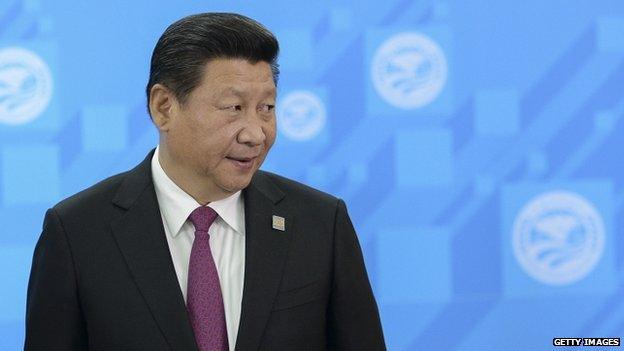
President Ma is disappointed not to have met President Xi (pictured) face-to-face
President Ma told me that after a rift of more than 60 years, both sides must show patience and caution.
"In fact, starting in 2005, the military balance of power in the Taiwan Strait has shifted toward mainland China as their defence budget has posted rapid double-digit growth annually, at times nearly 20%. It would be difficult for us to engage in an arms race with mainland China.
"So our defence principle is as follows: we want to create a scenario in which neither side would change the status quo through unilateral or non-peaceful means for fear of the price it would have to pay."

China-Taiwan relations
China formally regards Taiwan as a part of its territory, despite the island governing itself for six decades
China insists that nations cannot have official relations with both China and Taiwan, with the result that Taiwan has formal diplomatic ties with only two dozen countries - Pacific, Latin American and African states in the main
Long-standing tension with the mainland eased when the China-friendly President Ma Ying-jeou took office in May 2008
In July 2009 the leaders of China and Taiwan exchanged direct messages for the first time in more than 60 years, albeit in their respective party functions, and not as national leaders
In June 2010, the two countries signed an historic trade pact
But in March 2014, hundreds of young activists, dubbed the Sunflower Movement, occupied Taiwan's parliament building in an unprecedented protest against a trade pact aimed at forging closer ties with Beijing
The government's pro-China policy led to a crushing defeat for the ruling Kuomintang party in local elections in November 2014, forcing Mr Ma to step down as chairman

Peace strategy
But last week, video images emerged, external of a recent Chinese military exercise in which People's Liberation Army troops practised an urban assault on a building which looked like a mock-up of the presidential office in Taipei. President Ma told me he personally shared the displeasure of his government over the military exercise.
"Of course we have to be well-prepared for any potential conflicts across the Strait. But the top military strategy is to use a peace strategy not to use force."
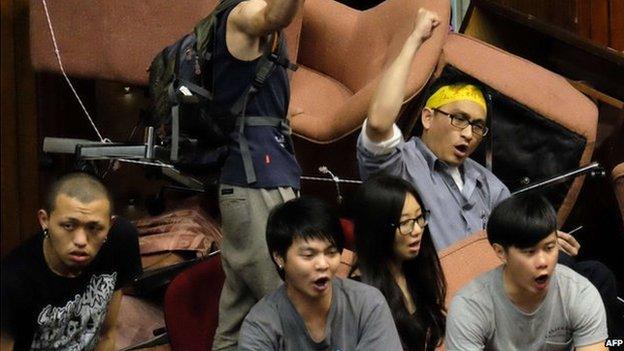
Students occupied Taiwan's parliament last year, calling for more scrutiny over all future dealings with China, including any trade agreements
I asked whether he would like a clear commitment from President Obama or his successor to defend Taiwan in the event of a Chinese invasion.
"The point is not just to rely on the United States to help us in any kind of conflict but to reduce the risk of conflict. The top military strategy is to use a peace strategy not to use military force."
President Ma and I talked for an hour about everything from last year's student occupation of parliament to next year's election for his successor. I hope the day will come when I can spend an hour with President Xi in Beijing.
When all is said and done, geography is both a blessing and a curse for this island and its 23 million citizens. Despite all the tourists and the exports criss-crossing the Taiwan Strait, China's rise creates many uncertainties. This island is a potent symbol of sovereignty for Beijing and the Taiwan Strait remains a dangerous flashpoint for the region and the world.
- Published15 January 2024
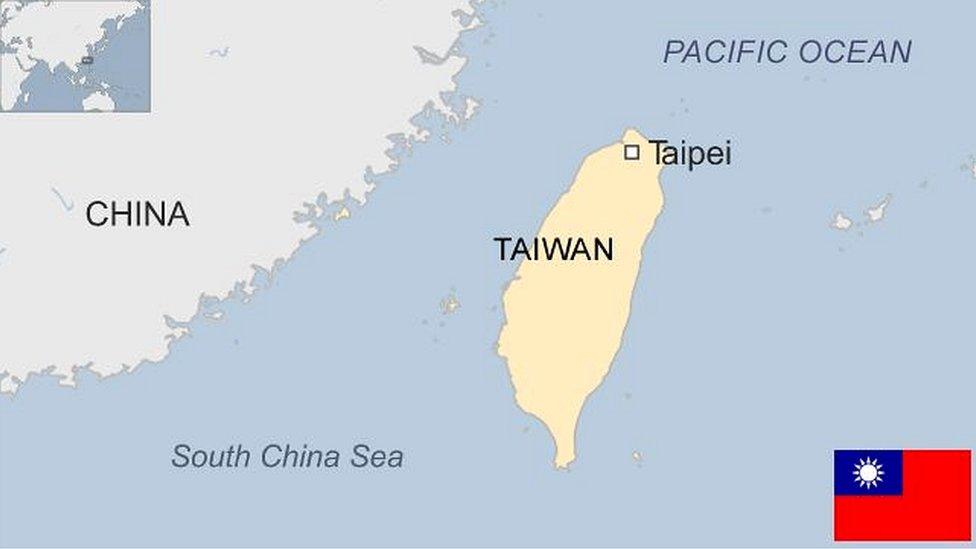
- Published21 July 2015
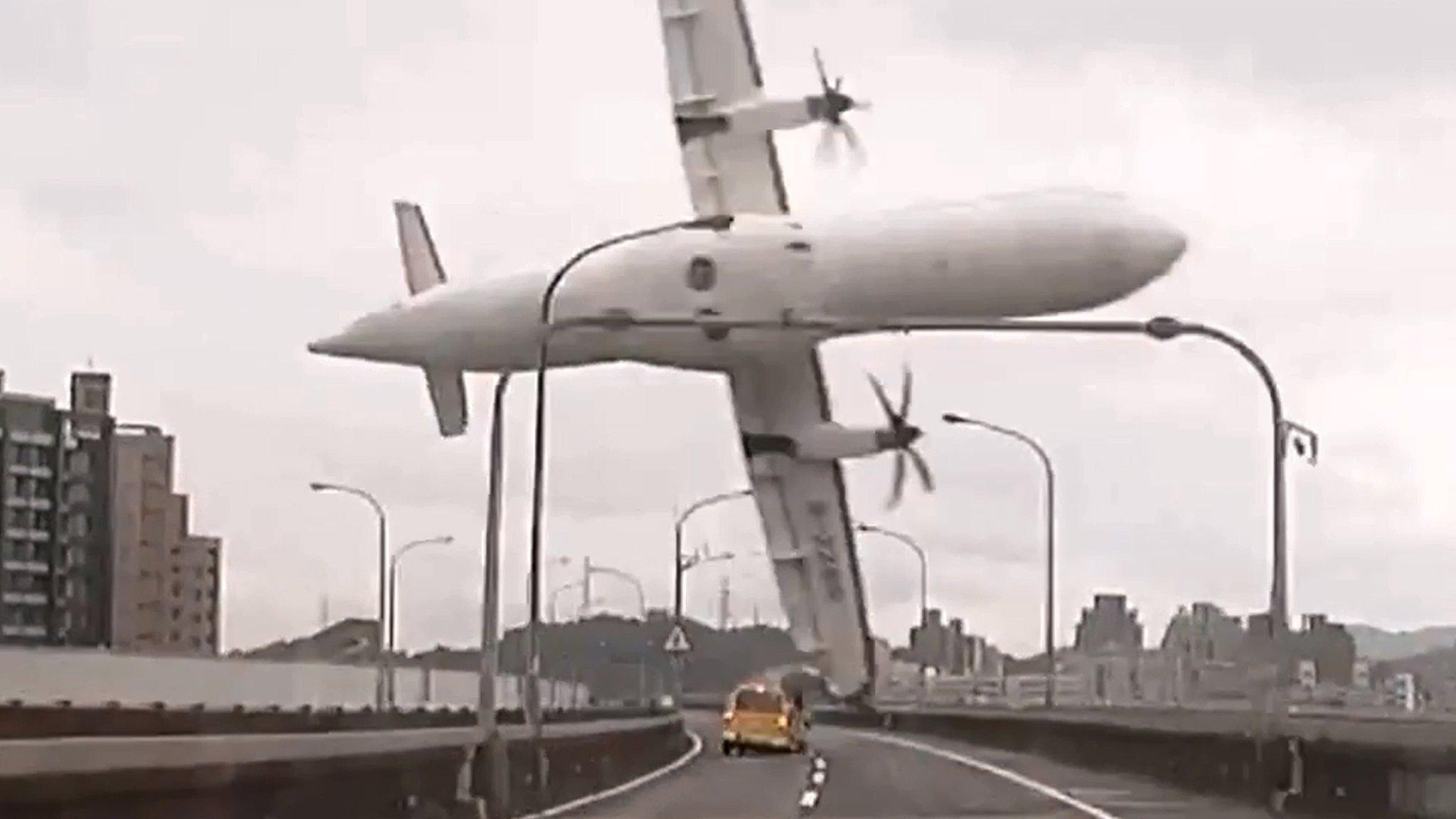
- Published20 July 2015
